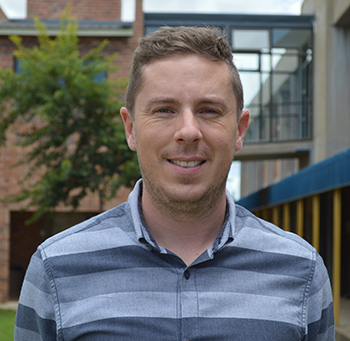Latest News Archive
Please select Category, Year, and then Month to display items
12 January 2024
|
Story Nonsindiswe Qwabe
|
Photo Sonia Small
 Since joining the UFS in 2008, Dr Grey Magaiza has worked extensively on approaches that can foster the socio-economic transformation of societies.
Since joining the UFS in 2008, Dr Grey Magaiza has worked extensively on approaches that can foster the socio-economic transformation of societies.
“The future should be one where communities can decide on their development agenda and futures. That’s the most important for me.” Dr Grey Magaiza, Deputy Director of the Centre for Gender and Africa Studies (CGAS) and Head of the Community Development programme on the Qwaqwa Campus, is passionate about capacitating communities to be agents of change and advancement. His vision for the future emphasises the empowerment of communities to take charge of their development by actively participating in decision making and the implementation of development projects that can improve their lives.
Since joining the UFS in 2008, Dr Magaiza has worked extensively on approaches that can foster the socio-economic transformation of societies. Over the years, he has crafted his research speciality into one that he is most proud of – being an interdisciplinary scientist immersed in the development of communities.
“I’m in a fortunate position of researching what I like. I say ‘fortunate’, because I’ve taken the time to understand what I’m passionate about, which is the overall field of rural livelihoods and livelihood futures – in short, community development. My research starts from an engaged university, understanding the elements that a university must use to enhance transformation and relevance to its immediate community in terms of development.”
One of the ways he has done this is by looking at social entrepreneurship as a development approach for young people in a rural setting. Through workshops with non-profit and civic organisations in Qwaqwa, Dr Magaiza has been helping these organisations to map out their needs and actively meet them through the involvement and support of external role players.
“We understand that communities are part of the national development agenda, but even that national agenda respects community knowledge and intentions and allows communities to shape their identity. A critical enabler of this is community organising. You bring back the capacity in communities to have dialogues on issues affecting them as spaces for engagement, knowledge exchange, and for people to just talk about their way forward.”
By enabling communities to define their development agenda, they can address their specific needs, challenges, and aspirations, he said. “When I look at livelihood futures, it’s quite an exciting aspect of my work – it’s like looking into a fortune tellers’ globe, because you’re not deciding for communities what they should do, but the communities themselves take those decisions.”
Academic appointed Editor-in-Chief of leading accredited History journal in South Africa
2017-02-15

Dr Jared McDonald, newly-appointed Editor-in-Chief
of Historia.
Photo: Thabo Kessah
The research profile of the Qwaqwa Campus has recently received a boost with the appointment of Dr Jared McDonald as the Editor-in-Chief of Historia, one of the leading accredited History journals in South Africa. It publishes articles in May and November on aspects of history and historiography of the Southern African region and is published by the Historical Association of South Africa (HASA).
Dr McDonald said it was an honour for him to be appointed in such a position, as it would enable him to further encourage critical engagement of historians. “I have served as the journal’s Review Editor for the past four years, so I am incredibly grateful for this appointment which will further enable historians to engage with one another as well as with scholars from other disciplines interested in grappling with the past,” he said.
Delivery of quality research to be strengthened
“My role will be to deepen the legacy of presenting historical themes to the broader public and the academic community, as well as enabling the delivery of quality research, while also strengthening Historia’s profile as a journal of choice for historians and scholars from related disciplines. In fact, having the editorship of such a journal based on the Qwaqwa Campus, is a welcome accolade for the campus,” he added.
Dr McDonald is Subject Head in the Department of History.